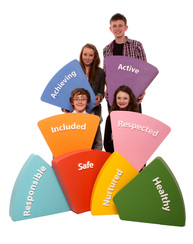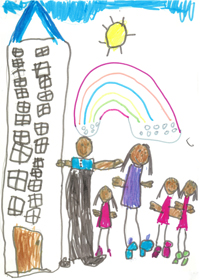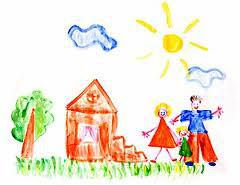|
Through ‘Getting it Right for
Every Child’ and ‘Curriculum For
Excellence’, the Scottish Government has set out its ambition for services
provided to children and young people, and for their learning. An important
part of our approach is the recognition that all children and young people are
different. To enable them to reach their full potential some will need additional
support.
The Education (Additional Support for Learning) (Scotland) Act 2004 provides the legal framework for the provision of additional support for learning. The legislation was amended by the Education (Additional Support for Learning) (Scotland) Act 2009. The Act is structured around the concept of support being needed for any reason, and for short or long term periods determined by the individual learning needs of the child or young person. The key duties on education authorities are to identify, make provision for, and review provision for the additional support needs of children and young people for whose education they are responsible. |
Systems at Gordon Primary School
Gordon Primary School and Nursery have a variety of procedures to assist in the early identification of children and young people that may require additional support for a particular area of learning. Identification and support planning will take place at the earliest possible stage.
The progress of all children is continuously monitored by staff in consultation with the school management team. Through applying our thorough tracking and monitoring systems at Gordon Primary school we aim to meet the needs of every single learner- whether these take the form of mental, social, emotional or physical needs.
It is likely that your child will receive some form of additional support throughout their primary education. Challenges that children experience may only be short term, or be confined to one aspect of learning. This can often be resolved by a little extra help from the class teacher or the Support for Learning teacher.
A few children experience long-term difficulties throughout school. In this case, the class teacher and Support for Learning Teacher will plan an Individual Education Programme for the child to follow within the class setting. If it is felt to be of benefit, a child may be withdrawn from class to receive individual support, although in most cases children will be supported within the class setting. Some children, who require help from a variety of supporting agencies, are officially designated as having a ‘Co-ordinated Support Plan’. Examples of agencies include Speech Therapist, Educational Psychologist, Behaviour Support or Occupational Therapist.
If you believe your child has additional support needs, Scottish Borders Council publishes a range of informative advice. Visit the following webpage for further details. https://www.scotborders.gov.uk/
Gordon Primary School and Nursery have a variety of procedures to assist in the early identification of children and young people that may require additional support for a particular area of learning. Identification and support planning will take place at the earliest possible stage.
The progress of all children is continuously monitored by staff in consultation with the school management team. Through applying our thorough tracking and monitoring systems at Gordon Primary school we aim to meet the needs of every single learner- whether these take the form of mental, social, emotional or physical needs.
It is likely that your child will receive some form of additional support throughout their primary education. Challenges that children experience may only be short term, or be confined to one aspect of learning. This can often be resolved by a little extra help from the class teacher or the Support for Learning teacher.
A few children experience long-term difficulties throughout school. In this case, the class teacher and Support for Learning Teacher will plan an Individual Education Programme for the child to follow within the class setting. If it is felt to be of benefit, a child may be withdrawn from class to receive individual support, although in most cases children will be supported within the class setting. Some children, who require help from a variety of supporting agencies, are officially designated as having a ‘Co-ordinated Support Plan’. Examples of agencies include Speech Therapist, Educational Psychologist, Behaviour Support or Occupational Therapist.
If you believe your child has additional support needs, Scottish Borders Council publishes a range of informative advice. Visit the following webpage for further details. https://www.scotborders.gov.uk/
Mediation
‘Enquire’ - the Scottish advice service for additional support for learning.
Operated by Children in Scotland, ‘Enquire’ offer independent, confidential advice and information on additional support for learning through:
‘Enquire’ - the Scottish advice service for additional support for learning.
Operated by Children in Scotland, ‘Enquire’ offer independent, confidential advice and information on additional support for learning through:
- a telephone helpline - 0845 123 2303
- an email enquiry service - [email protected]
- an online enquiry service
- www.enquire.org.uk
|
Looked After and Accommodated Young People
Some children and young people are unable to live at home with their parent(s) and the local authority has a legal responsibility to care for them. This care can be provided in foster families, residential houses or residential schools depending on their individual needs. Wherever possible, children and young people are expected to attend their original pre-five resource or school to minimise disruption to their lives. Where this is not possible the next preferred option would be to attend mainstream school with support if necessary. Each school has a designated staff member, usually in a senior management position, who has responsibility to know of any child or young person who attends their school and who is looked after and accommodated away from home. Within Gordon Primary School the designated person for this role is the Depute Head Teacher. We will ensure that any issues or concerns around the child or young person is addressed and communicated to the social worker responsible for the child or young person. Foster carers and residential care staff act in place of the birth parents of the child or young person on everyday matters and should be provided with the support and advice of school staff which would be given to birth parents. If there are any issues or concerns relating to a child or young person who is looked after and accommodated within the school, the child’s teacher should be informed about these in the first instance and further advice can then be pursued as appropriate with school management staff and social work staff. The overall aspiration for children and young people who are looked after and accommodated is that they are supported, included and treated no differently in school than their peers. |




